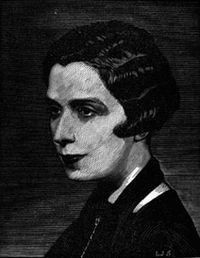Princess Marthe Bibesco: Difference between revisions
No edit summary |
No edit summary |
||
| (One intermediate revision by the same user not shown) | |||
| Line 1: | Line 1: | ||
====Date: [[:Category: | ====Date: [[:Category:1886|1886]]-[[:Category:1973|1973]]==== | ||
====Region: [[:Category:Europe|Europe]]==== | ====Region: [[:Category:Europe|Europe]]==== | ||
| Line 8: | Line 8: | ||
---- | ---- | ||
[[File:Marthe_Bibesco.jpg|right|200px]] | |||
'''Artist:''' Princess Marthe Bibesco, former aristocrat of Romania | '''Artist:''' Princess Marthe Bibesco, former aristocrat of Romania | ||
Latest revision as of 19:42, 29 July 2011
Date: 1886-1973
Region: Europe
Subject: Political/Economic/Social Opinion
Medium: Literature
Artist: Princess Marthe Bibesco, former aristocrat of Romania
Confronting Bodies: Romanian Communist Party
Dates of Action: 1945
Location: Romania
Description of Artwork: Bibesco has written several works. In "The Eight Paradises" she wrote about the impressions of a young couple sent on a diplomatic mission to Prussia; "Catherine-Paris" gives a vivid description of Europe before World War I; and "Isvor, the Country of the Willows" depicts a mystical Romanian world that opposes the communist vision.
The Incident: When the Communists took over Romania at the close of World War II Bibesco was exiled from the country, her manuscripts were siezed and her books banned. Her books were withdrawn from circulation in the library, and only made available for researchers and Communist officials.
Results of Incident: An abridged version of her, Jurnal Politic, was available in the National Library of Romania.
Source: Censorship, A World Encyclopedia, ed. D. Jones
